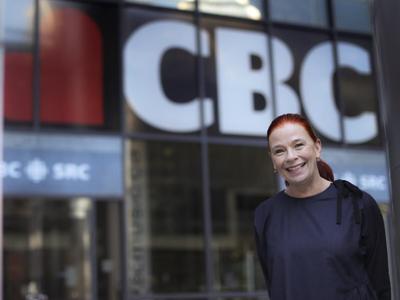Following news of mass cuts and layoffs at the CBC and Radio-Canada on Monday, CBC’s CEO Catherine Tait went on the network’s flagship news show and declined to say whether the public broadcaster’s executives would be receiving bonuses.Ìý
Adrienne Arsenault, host of “The National” on CBC, asked Tait, “I’m going to presume, no bonuses this year? … Can we establish (that) is not happening this year?”
“It’s too early to say where we are for this year, we’ll be looking at that like we do for all our line items in the coming months,” Tait said, just hours after telling employees that the CBC would be cutting 600 jobs, leaving 200 positions vacant and cutting $40 million from the broadcaster’s programming budget in order to fill a $125-million shortfall.Ìý
How much do CBC executives make?
According to information obtained by the Canadian Taxpayers Federation, an advocacy group focused on lower taxes, in 2022 the CBC paid out over $16 million in bonuses to 1,142 full-time employees.Ìý
Other executives echoed Tait’s statements to employees during the town hall meeting where the layoffs and cuts where announced. In an audio recording of the meeting, provided to the Star by a CBC employee, CBC’s Chief Transformation Officer Marco Dubé told employees workers, “We’re not contemplating at this point any changes to our compensation for any classification of employment within the organization.”
CBC does not make its senior executive compensation public. It does, however, publish the pay bands for the president and CEO, the executive vice-president positions and the vice-president positions. Tait, as president and CEO, makes from $442,900 to $521,000 in base salary, while other senior management receive between $258,000 to $436,500. Bonuses for crown corporation CEOs have a maximum set by the federal government. In Tait’s case, based on her salary range and at the maximum bonus of 28 per cent, she can receive up to $124,012 to $145,880 in bonuses.
“For privacy and competitive reasons we do not disclose individualÌýsalaries. Rather, weÌýpresent executive compensation in pay bands, numbers of people, and averages to remain accountable to Canadians, while also respecting privacy rules,” a spokesperson for the CBC, Leon Mar, explained to the Star.Ìý
Romayne Smith-Fullerton, a media studies professor at Western University and self-professed “big fan of public broadcasting,” said Tait leaving the door open to executive bonuses was “incredibly tone deaf.”
“There should be greater transparency around things like salaries and Christmas bonuses at a time when people are losing their jobs,” Smith-Fullerton told the Star.
In her view, the CBC and Radio-Canada, has a “distinct obligation in a democracy that the other crown corporations do not have.”
“I think we need to remove our expectation that the CBC is somehow going to make money. That was not what it was intended to do. It was never supposed to be a commercially profitable undertaking,” Smith-Fullerton said.Ìý”It needs a different funding model and it needs to do something specific that doesn’t put it in direct competition with privately-owned for-profit outlets.”
Why are the CBC and Radio-Canada cuts happening?
“I know many of you have been thinking about this and are anxious about the future — your future,” Tait said to employees at the town hall. “And we want to tell you as much as we can when we know it and be as open and transparent as possible …ÌýEvery part of the organization will be affected by this.”
Tait blamed “inflation, significant cost increases for production and operations and of course, fierce competition from digital giants, as well as the continued decline in revenue linked to our traditional television services” as underlying factors behind the cuts. On top of the “significant stress” faced by the Canadian media industry more broadly, Tait said the public broadcaster is being mandated by the federal government to cut 3.3 per cent of its costs.
In March,Ìýthe government mandatedÌýfederalÌýagencies, departments and crown corporations to cut three per cent off of their existing budgets.
“We continue to make our case to the government regarding our value,” Tait said at the town hall.Ìý
Tait also emphasized that the cuts would be “phased” and “gradual” in order to allow the public broadcaster to change direction should its financial future reverse course.
Dubé, asked at the town hall by an employee about retirement incentives, said there would be no retirement programs as they are “very, very costly.”Ìý
“I do understand, though, that we want to protect as much as possible younger demographics within our workforce and certainly people from under-represented groups,”ÌýDubé added.
Heritage minister passes the buck
On Monday, in a press conference pre-empting the announcement of the cuts, heritage minister Pascale St-Onge emphasized the Liberal government’s support for the public broadcaster. The minister also said CBC and Radio-Canada should be eligible for money under theÌýnew $100 million-a-year deal with Google.Ìý
The federal government struck a deal with Google on Nov. 29 after a stand off over the Online News Act, which required tech giants like Google and Meta to pay news outlets for content linked on their platforms. The new agreement puts a $100-million yearly cap on payments that Google is required to make to media companies. Torstar owner and publisher of the pc28¹ÙÍøStar Jordan Bitove saidÌýthe deal was a “disappointment.”ÌýMeanwhile, Meta hasÌýblocked news content for Canadian users on Facebook and InstagramÌýsince August in protest of the Online News Act.
Asked on Tuesday about the potential for executive bonuses at the CBC amidst the cuts and layoffs, St-Onge referred reporters to the CBC.Ìý
“I think that (CBC executives) should be answering to you. They are accountable to the general public. CBC (and) Radio-Canada belongs to the Canadian population, and I think you should redirect your question directly to them,” St-Onge said.





























To join the conversation set a first and last name in your user profile.
Sign in or register for free to join the Conversation